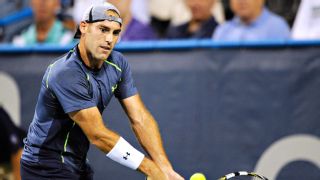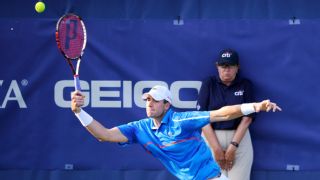|
For decades, the American men had a commanding presence on center stage at Flushing Meadows. We saw John McEnroe and Jimmy Connors win nine championships between them. Then Pete Sampras, Andre Agassi, Jim Courier and Michael Chang contended for the title for a decade and a half. And there was Andy Roddick, who served his way to the crown in 2003. But these days, the tournament revolves around international stars such as Roger Federer, Rafael Nadal (not playing this year because of a wrist injury) and Novak Djokovic, who have dominated the game and gained huge followings. The Americans, meanwhile, are no longer big shots, but long shots. No American man has won the US Open -- or any Grand Slam -- since Roddick more than a decade ago. No American man has reached a Grand Slam final since Roddick at Wimbledon in 2009. Only one American man still playing has reached a major semifinal, and that player is 31-year-old Robby Ginepri, whose 2005 US Open final four appearance makes him the most accomplished Grand Slam performer on the men's tour.  "Say it again and again and again. It's got a nice tone to it," Ginepri said, smiling, at the Cincinnati Masters. And Ginepri will not be in the US Open -- or at least, not straight in. Despite cutting his ranking from the 400s to almost 200 in the previous four months, he did not receive a wild card into the tournament and will have to play qualifying instead. The American men's campaign will be led by U.S. No. 1 John Isner, who is ranked No. 15 and has been as high as No. 9. Although he has never gone further than the quarterfinals in 2011, Isner is known for playing his best tennis in U.S. events and can threaten anyone with his big-serving game. In 2013, Isner's record in the United States (not counting Davis Cup) was 29-9 -- and just 9-13 elsewhere. "I've always played well," he said of his performances during the US Open Series. "This year started off fantastic. I won Atlanta, but then I had a couple of hiccups in Washington and Toronto, which is very unlike me." The 29-year-old followed up by reaching the third round of the Cincinnati Masters, holding two match points against former US Open champion Andy Murray. He knows that the big names will not want to see him in their section of the draw. "If I play the right way, I'm going to be tough to beat there," he said. But Isner's tendency to play tight matches featuring tiebreakers and five-setters also means the majority of his contests can swing either way. German Philipp Kohlschreiber has ousted him at the previous two US Opens. So he is looking to take advantage of crowd support, this coming after he criticized spectators a year for rooting for his second-round opponent, Gael Monfils. Isner was also unhappy that his opening round at the Washington event this year wasn't on the stadium court. "When I'm playing in the States, I want to play on center court; I want to have the crowd on my side," he said. "It's good, I guess, I'm the No.1 American." Along with the support, however, there is usually the pressure that comes with playing at home. The state of American men's tennis has attracted plenty of comment, particularly after Roddick's retirement in 2012 and former top-10 player Mardy Fish taking an indefinite break from the sport because of psychological reasons related to a heart problem he experienced in 2012. But years of not contending has also reduced expectations and led to a lower profile for the American men. Isner is the only U.S. representative in the top 40, with five others -- Donald Young, Steve Johnson, Jack Sock, Sam Querrey and Tim Smyczek -- in the top 100. A year ago, Isner and wild card Smyczek were the only Americans to reach the third round in the men's draw. When there is scrutiny, the players have generally responded by dismissing comparisons to previous generations and attempting to avoid the responsibility of augmenting the status of American tennis. "I don't feel any pressure. I'm playing for myself," Querrey said in an interview with ESPN.com. "I want to do the best I can. "When people talk about, 'no American man's making the semifinals.' I don't [think] it affects any one of us." They are also expressing modest expectations. "It's a big tournament, but they're all big tournaments for me right now," Querrey, whose ranking has dipped to No. 56, said of the US Open. "I'll take wins wherever. "In 2010, 2012, 2009, some of the years when I was in the top 20, I wanted to feel good going into the Open, hoping to make a run." Isner's best showing was a quarterfinal in 2011, also his best Grand Slam result. "It's one of my favorite tournaments," he said. "I would say it's our Grand Slam. I've always played extremely well there, also." Being a top U.S. up-and-comer has usually come with intense pressure, but the demands are now reduced. Jack Sock, 21, says the presence of Isner and other veterans means he has not yet been thrust into the spotlight. "It's not there yet," Sock said in an interview with ESPN.com. "John and those guys have done a great job staying up there. I'm just trying to improve all the time myself and keep winning and keep moving up the rankings."  Sock, who won the Wimbledon doubles with Canadian Vasek Pospisil and reached the third round of the US Open in 2013, appears to like the big occasion. "I feel more the advantage than the pressure," he said. "I've typically not been the one to get too nervous when I play. I kind of welcome it. The more, the merrier; louder, the better. Especially playing in front of your home crowds, I've had some pretty unbelievable experiences -- some pretty electric atmospheres." The thinness in the men's ranks is in contrast to the American women's side, which has Serena Williams at No. 1, Venus Williams returning to the top 20 and a strong presence in the top 50 that includes younger players such as Sloane Stephens and Madison Keys. "Obviously you feel, you know, a little bit more attention when you're in the U.S. and it's before the US Open," Keys said. "But, I mean, it is kind of nice being a girl because there are so many of us right now. There is not one sole focus. Then obviously we have Venus and Serena, who are still doing really well." Of the guys, she said, "You'd have to ask them, but I would imagine it's probably ‑‑ I think the girls are a little bit happier." But whatever their reaction, there's less attention being paid to it these days.
|
